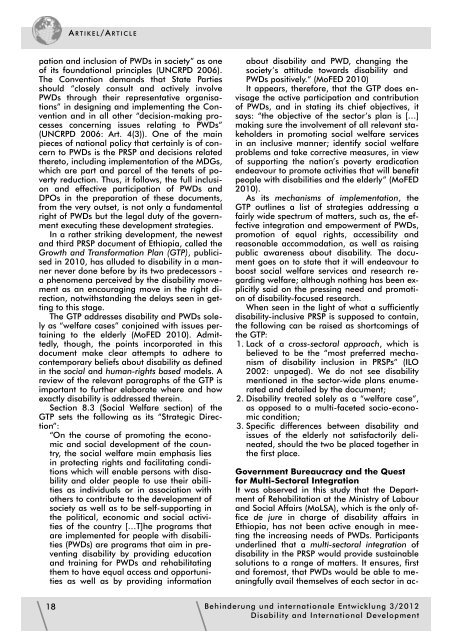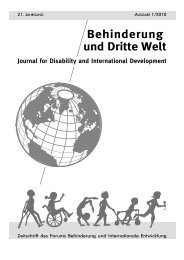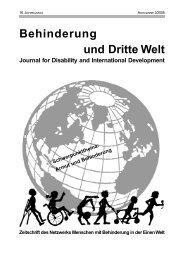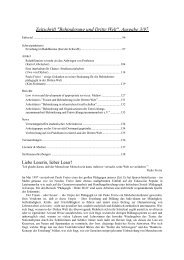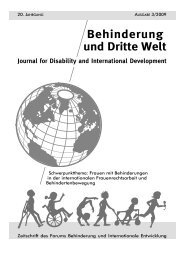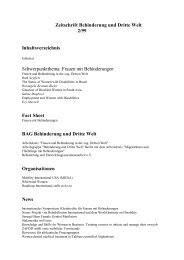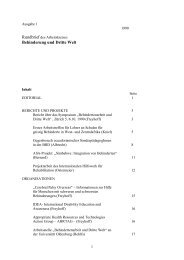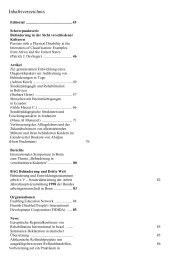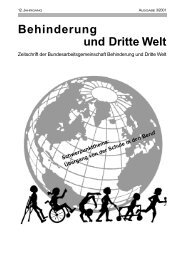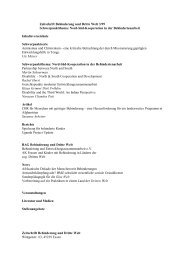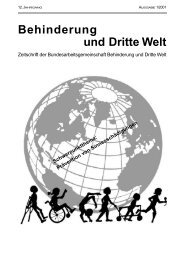Behinderung und internationale Entwicklung Disability and ...
Behinderung und internationale Entwicklung Disability and ...
Behinderung und internationale Entwicklung Disability and ...
You also want an ePaper? Increase the reach of your titles
YUMPU automatically turns print PDFs into web optimized ePapers that Google loves.
A RTIKEL/ARTICLEpation <strong>and</strong> inclusion of PWDs in society” as oneof its fo<strong>und</strong>ational principles (UNCRPD 2006).The Convention dem<strong>and</strong>s that State Partiesshould “closely consult <strong>and</strong> actively involvePWDs through their representative organisations”in designing <strong>and</strong> implementing the Convention<strong>and</strong> in all other “decision-making processesconcerning issues relating to PWDs”(UNCRPD 2006: Art. 4(3)). One of the mainpieces of national policy that certainly is of concernto PWDs is the PRSP <strong>and</strong> decisions relatedthereto, including implementation of the MDGs,which are part <strong>and</strong> parcel of the tenets of povertyreduction. Thus, it follows, the full inclusion<strong>and</strong> effective participation of PWDs <strong>and</strong>DPOs in the preparation of these documents,from the very outset, is not only a f<strong>und</strong>amentalright of PWDs but the legal duty of the governmentexecuting these development strategies.In a rather striking development, the newest<strong>and</strong> third PRSP document of Ethiopia, called theGrowth <strong>and</strong> Transformation Plan (GTP), publicisedin 2010, has alluded to disability in a mannernever done before by its two predecessors a phenomena perceived by the disability movementas an encouraging move in the right direction,notwithst<strong>and</strong>ing the delays seen in gettingto this stage.The GTP addresses disability <strong>and</strong> PWDs solelyas “welfare cases” conjoined with issues pertainingto the elderly (MoFED 2010). Admittedly,though, the points incorporated in thisdocument make clear attempts to adhere tocontemporary beliefs about disability as definedin the social <strong>and</strong> human-rights based models. Areview of the relevant paragraphs of the GTP isimportant to further elaborate where <strong>and</strong> howexactly disability is addressed therein.Section 8.3 (Social Welfare section) of theGTP sets the following as its “Strategic Direction”:“On the course of promoting the economic<strong>and</strong> social development of the country,the social welfare main emphasis liesin protecting rights <strong>and</strong> facilitating conditionswhich will enable persons with disability<strong>and</strong> older people to use their abilitiesas individuals or in association withothers to contribute to the development ofsociety as well as to be self-supporting inthe political, economic <strong>and</strong> social activitiesof the country […T]he programs thatare implemented for people with disabilities(PWDs) are programs that aim in preventingdisability by providing education<strong>and</strong> training for PWDs <strong>and</strong> rehabilitatingthem to have equal access <strong>and</strong> opportunitiesas well as by providing informationabout disability <strong>and</strong> PWD, changing thesociety’s attitude towards disability <strong>and</strong>PWDs positively.” (MoFED 2010)It appears, therefore, that the GTP does envisagethe active participation <strong>and</strong> contributionof PWDs, <strong>and</strong> in stating its chief objectives, itsays: “the objective of the sector’s plan is […]making sure the involvement of all relevant stakeholdersin promoting social welfare servicesin an inclusive manner; identify social welfareproblems <strong>and</strong> take corrective measures, in viewof supporting the nation’s poverty eradicationendeavour to promote activities that will benefitpeople with disabilities <strong>and</strong> the elderly” (MoFED2010).As its mechanisms of implementation, theGTP outlines a list of strategies addressing afairly wide spectrum of matters, such as, the effectiveintegration <strong>and</strong> empowerment of PWDs,promotion of equal rights, accessibility <strong>and</strong>reasonable accommodation, as well as raisingpublic awareness about disability. The documentgoes on to state that it will endeavour toboost social welfare services <strong>and</strong> research regardingwelfare; although nothing has been explicitlysaid on the pressing need <strong>and</strong> promotionof disability-focused research.When seen in the light of what a sufficientlydisability-inclusive PRSP is supposed to contain,the following can be raised as shortcomings ofthe GTP:1. Lack of a cross-sectoral approach, which isbelieved to be the “most preferred mechanismof disability inclusion in PRSPs” (ILO2002: unpaged). We do not see disabilitymentioned in the sector-wide plans enumerated<strong>and</strong> detailed by the document;2. <strong>Disability</strong> treated solely as a “welfare case”,as opposed to a multi-faceted socio-economiccondition;3. Specific differences between disability <strong>and</strong>issues of the elderly not satisfactorily delineated,should the two be placed together inthe first place.Government Bureaucracy <strong>and</strong> the Questfor Multi-Sectoral IntegrationIt was observed in this study that the Departmentof Rehabilitation at the Ministry of Labour<strong>and</strong> Social Affairs (MoLSA), which is the only officede jure in charge of disability affairs inEthiopia, has not been active enough in meetingthe increasing needs of PWDs. Participants<strong>und</strong>erlined that a multi-sectoral integration ofdisability in the PRSP would provide sustainablesolutions to a range of matters. It ensures, first<strong>and</strong> foremost, that PWDs would be able to meaningfullyavail themselves of each sector in ac-18<strong>Behinderung</strong> <strong>und</strong> <strong>internationale</strong> <strong>Entwicklung</strong> 3/2012<strong>Disability</strong> <strong>and</strong> International Development


